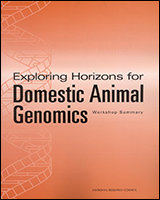NCBI Bookshelf. A service of the National Library of Medicine, National Institutes of Health.
Pool R, Waddell K; National Research Council (US). Exploring Horizons for Domestic Animal Genomics: Workshop Summary. Washington (DC): National Academies Press (US); 2002.

Exploring Horizons for Domestic Animal Genomics: Workshop Summary.
Show detailsOver the past several years, scientists from the United States and around the world have been using a technique called DNA sequencing to unlock the genetic code of many different organisms. With code in hand, scientists can design sophisticated experiments that will inform our understanding of how an organism develops and functions. To date, they have carried out partial or complete DNA sequencing on human, mouse, rat, bacterial, and plant genomes. A major finding that was confirmed from these efforts is that most biologic functions are genetically conserved within and between species. This means that by studying related organisms, we acquire biologic knowledge that is broadly applicable. Sequencing the genomes of different kinds of organisms sheds more light on biologic understanding than would, for example, sequencing the genome of only a single type of organism. In essence, the more organisms that are sequenced, the greater the intellectual yield will be. Once sequenced, the DNA provides scientists with important clues about the genes and proteins that are required to create and sustain related organisms.
Why not sequence every organism scientists can get their hands on? Unfortunately, sequencing is very expensive and time consuming. At this time, obtaining a draft sequence of a mammalian genome costs as much as 100 million dollars and can take up to a year. Consequently, scientists, policymakers, and funding agencies must select carefully among the organisms they will sequence, depending on the kind of knowledge sought. Two major categories of animals that are primed for extensive genomic exploration are domesticated farm animals such as pigs, sheep, chickens, cattle, horses, and companion animals such as dogs and cats. Both groups have a number of appealing attributes that make them appropriate candidates for genomic analysis. They offer great potential for advancing human and animal health knowledge, improving animal production practices, and they have an economic benefit. For example, scientists can attempt to locate or approximate the gene or genes that confer disease resistance, which is useful in reducing health maintenance costs in animal production operations. Moreover, in some instances these animals have a sentimental value that distinguishes them from other organisms.
Recognizing the important contributions that genomic analysis can make to agriculture, production and companion animal science, evolutionary biology, and human health with respect to the creation of models for genetic disorders, the National Academies convened a group of individuals to plan a public workshop that would: (1) assess these contributions; (2) identify potential research directions for existing genomics programs; and (3) highlight the opportunities of a coordinated, multi-species genomics effort for the science and policymaking communities. Their efforts culminated in a workshop sponsored by the U.S. Department of Agriculture, Department of Energy, National Science Foundation, and the National Institutes of Health. The workshop was convened on February 19, 2002. The goal of the workshop was to focus on domestic animal genomics and its integration with other genomics and functional genomics projects (see Box 1-1). The following is a summary and synthesis of the discussion, prepared by a science writer as a factual account of what occurred at the workshop.
- Introduction - Exploring Horizons for Domestic Animal GenomicsIntroduction - Exploring Horizons for Domestic Animal Genomics
- Homo sapiens OCIA domain containing 1 (OCIAD1), transcript variant 4, mRNAHomo sapiens OCIA domain containing 1 (OCIAD1), transcript variant 4, mRNAgi|1889606310|ref|NM_001079841.3|Nucleotide
- MAG: Olavius algarvensis Gamma 3 endosymbiont isolate Gamma3_OalgB6SA genome ass...MAG: Olavius algarvensis Gamma 3 endosymbiont isolate Gamma3_OalgB6SA genome assembly, contig: NODE_100703+_length_11971_cov_170.998, whole genome shotgun sequencegi|1981678253|emb|CAJINB010000002.1Nucleotide
- Homo sapiens BCL2 related protein A1 (BCL2A1), transcript variant 2, mRNAHomo sapiens BCL2 related protein A1 (BCL2A1), transcript variant 2, mRNAgi|1675176094|ref|NM_001114735.2|Nucleotide
- Microbe sample from Mesorhizobium onobrychidisMicrobe sample from Mesorhizobium onobrychidisbiosample
Your browsing activity is empty.
Activity recording is turned off.
See more...